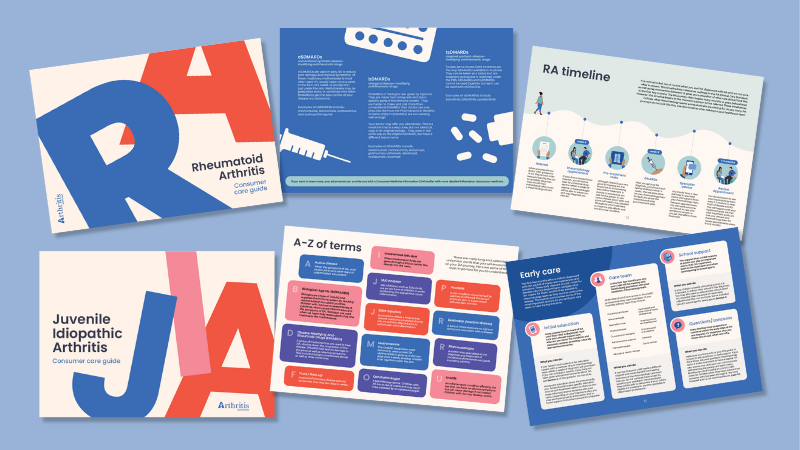Choosing Your Healthcare Team
Why do I need a team?
One of the realities of having a chronic health condition is that you will most likely need to see a range of healthcare professionals over a long period of time.
You could allow your GP or someone else to suggest who you could see and when to see them. However, actively choosing your own team will help you gain a better understanding of your condition, assess which treatments are right for you and help you manage your health more effectively. It also helps you to have a sense of control over your condition rather than the other way around.
Your team will generally be made up of a number of individuals including medical professionals, allied health practitioners and possibly your family and friends. The person at the centre of your team is YOU. You get to choose who is on your team and what role they will play in supporting you.
Who can I have on my team?
Family/Friends
If you have a partner, carer or someone that helps you out with your day to day needs then they will certainly be on your team, as they can give you the emotional support needed to help manage the good as well as the bad days.
General Practitioner
The next key person is normally your GP. Developing a good relationship with your GP is very important, as you will most likely see them a majority of the time and coordinate your healthcare team with them. Your GP will refer you to appropriate specialists and be a central point of contact for all team members.
Specialist Clinicians
Your team may incorporate a number of specialist clinicians depending on your individual needs.
Generally, your main specialist will be a Rheumatologist. Rheumatologists diagnose, assess/monitor and help you manage conditions that affect your joints and the soft tissue that surrounds them. Their expertise covers hundreds of arthritic and musculoskeletal conditions.
People with Fibromyalgia may be referred to a Neurologist, who specialise in conditions affecting the nervous system.
An Endocrinologist is an expert in hormones and how they interact with multiple systems within the body. They could help you investigate the interrelationship between your arthritis and other conditions such as diabetes and other autoimmune diseases.
A Gastroenterologist is an expert in the gut and digestive system. There is a relationship with gut bacteria and autoimmune diseases (much research is being done in this area), therefore seeing a Gastroenterologist is becoming more common who are diagnosed with auto-immune arthritis..
Arthritis and other related conditions could potentially affect you to the point where you need surgery. There are a number of Specialist Surgeons who will work with you to help you achieve the best possible outcome.
Other specialists on your team could include a Haematologist, Ophthalmologist, Gastroenterologist, or even a Dentist.
Other allied health professionals
Your local Pharmacist should be an essential part of your team. They can give you advice on your medications, answer questions about general medical concerns, keep track of your prescriptions, as well as review your medications and vitamins to ensure you your medications are appropriately taken
You may want a Psychologist on your team. They help to treat a wide range of mental health issues using approaches like Cognitive Behaviour Therapy. Generally, they will work with you over a series of appointments and give you the coping tools needed to handle all the stressful issues that come with having chronic pain and invisible illnesses.
Many people include an Exercise Physiologist or Physiotherapist on their team to learn ways to move and strengthen the body, reduce stress on the joints and help to relieve pain.
An Occupational Therapist can help find ways for you to participate more easily in the ‘occupations’ of your daily life. This could be at your workplace but it could also be any task or activity you regularly engage in, such as dressing, shopping, driving or socialising. They may suggest modifications to your physical environment or changing an activity to help support your general health and wellbeing.
Some autoimmune conditions and medications can affect the health of your eyes. It is a good idea to have regular check-ups with your Optometrist so they can detect and manage any issues that may arise as early as possible.
A Dietician can show you how to establish a nutritious menu plan that works with and not against your conditions and medications. Making even small changes to your diet can result in improved vitality.
To help your body function at its optimum level you could also include a Podiatrist, Chiropractor or Osteopath in your team.
Team members from the wider community
Some often overlooked but very useful members of your support team could be your Rheumatologist’s personal assistant, Nurse Practitioners, Pathology Nurses or Health Clinic Nurses. Nurses are usually qualified to discuss medications with you and can answer many questions you would normally ask your doctor.
Peer Support Groups are full of people going through similar challenges to you. The members understand things like fatigue and ‘brain fog’, disclosing your health issues at work and coping with chronic pain while trying to maintain a ‘normal’ life. You can share your experiences and ask questions in a friendly and non-judgemental environment.
How do I decide who to include?
Your GP can certainly help you choose your main team members. They will consider your needs and circumstances and refer you to the appropriate specialists. You can also ask people you trust such as a family member, friend or someone in your support group for their recommendations.
Choosing the right person to be in your team is a bit like hiring a new employee: first impressions and gut feelings do count. Sometimes you connect with somebody instantly and other times your instinct may tell you they are not the right person/s for your team.
It’s a good idea to create a shortlist of practitioners you are considering for various roles in your team. Check their credentials and see if they are members of professional associations. You can even give them a ‘test run’ by booking an initial appointment before deciding if you want to come continue on a regular basis.
What if I don’t like them or disagree with their opinion?
If your team is going to function effectively, each member needs to be someone you trust, listens to you, takes you seriously and makes decisions with you, and not for you. It is important that they are all aware of each other and are willing to work with each other.
If you don’t feel comfortable with a person or you don’t agree with their approach, you are perfectly entitled to seek a second opinion. You don’t have to use a specialist that your GP refers you to if you don’t want to. You also don’t have to stick to the same GP if you feel they are not meeting your healthcare needs.
It is quite acceptable to book an initial appointment with a different practitioner to give them a ‘trial run’. You are also entitled to have your records transferred to your new practitioner. Don’t be embarrassed about it, it is a common practice and they are unlikely to take it personally.
Where do I find other healthcare professionals?
Your GP will have lists of many healthcare providers in your area. Also, organisations such as Arthritis Australia and professional associations have a list of service providers. You can browse their websites or call their support phone lines.
There are many online directories catering to different fields of healthcare. Often you simply need to enter your post code and the site will automatically generate a list of service providers near you.
The people in your peer support groups can give personal recommendations for a range of practitioners. Keep in mind that we are all different and you may not like the person suggested.
How do I pay for it all?
Medicare provides a range of options to help you cover the cost of your healthcare. You can claim some or all of the cost of seeing a GP and many other healthcare professionals. Sometimes you may have to pay the ‘gap’ or difference between the Medicare’s scheduled fee and the doctor’s actual fee.
If you have a pension or allowance from Centrelink, you may be entitled to a Pensioner Concession Card or a Healthcare Card. These entitle you to discounts for many healthcare services.
If you have chronic health conditions that are likely to last more than 6 months you may be able to participate in a Chronic Disease Management program available through your GP. You and your GP can decide on a particular health goal or series of goals you would like to achieve. For example your goals may be to lose weight, learn better ways to exercise or to reduce pain.
Your GP may then decide to initiate a General Practitioner Management Plan (GPMP) and / or a Team Care Arrangement (TCA) for you through Medicare. You will then be able to nominate two or more approved healthcare practitioners such as dieticians, podiatrists or exercise physiologists who will then be included in your plan. Again, you may have to pay a gap fee for each service. You can ask for this information when selecting your practitioners.
If you are feeling anxious, struggling to cope with your condition or have any concerns about your mental health, your GP can also help you access a Mental Health Treatment Plan, where you can enlist the help of psychiatrists, psychologists, occupational therapists or eligible social workers. Medicare will issue a rebate for up to 10 approved appointments per calendar year.
Private health insurance providers offer benefits that you can claim for services provided by many private healthcare practitioners. Your cover could include optical, dental, chiropractic or a wide variety of other specialist/allied health services. Some also provide wellness programs or cover the cost of membership for disease management associations such as Arthritis Australia. It is important to check the details of your cover and see if it is giving you the best value for your current needs.
Where to from here?
When you have so many people in your team you need to be organised. Keep a list of all your current medications and give it to all your relevant team members. Know when your appointments are and have a list of questions or points to discuss before you go. There are many smartphone apps and online resources available to help make your day to day life easier to manage.
Your team can include many different people all working to help you live well with your chronic condition but the most important member of your team is YOU. You are your own ringmaster. The more you know about your condition and utilise the people and resources around you, the easier your life will be.





